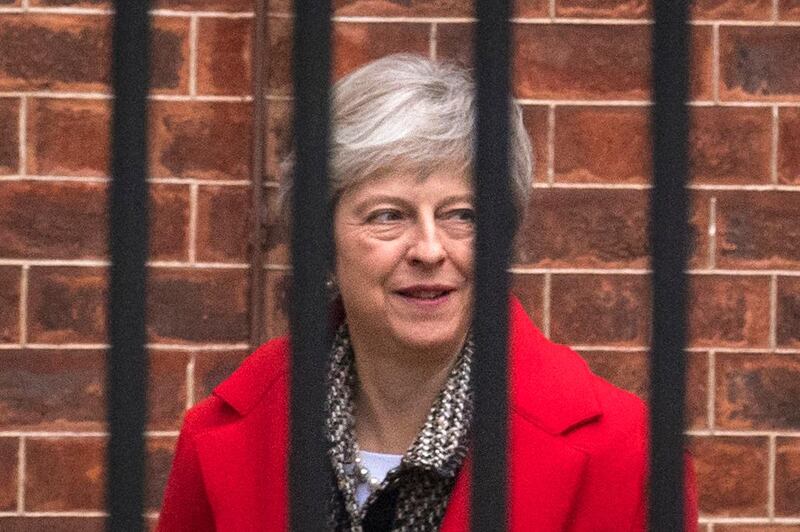British Prime Minister Theresa May told rebellious politicians in her Conservative Party on Sunday that ousting her would not help the progress of the Brexit negotiations.
After the most tumultuous week of her premiership, in which senior ministers quit over the draft divorce deal agreed with the EU, Mrs May said she would be heading to Brussels for talks on the "future relationship".
She told Sky News that the UK would be leaving the EU on March 29 next year, “let no one be in doubt”.
In a pointed warning to those who had called publicly for her unseating, she said that "a change of leadership at this point isn't going to make the negotiations any easier and it isn't going to change the parliamentary arithmetic”.
When asked how the calls for her removal had affected her, Mrs May said: "It doesn't distract me. Politics is a tough business and I've been in it for a long time.”
By Sunday afternoon, a total of 25 MPs had revealed they had sent no-confidence letters to the chairman of the party’s 1922 Committee, Sir Graham Brady. Forty-eight letters are needed to trigger a vote of no confidence.
Sir Graham said the threshold had not been reached but if it was he would act immediately to ensure a vote took place.
"The intention is clear that if it were to happen it ought to be a test of opinion very quickly in order to clear the air and get it out of the way," he told BBC radio.
Sir Graham, a pro-Brexit MP for Altrincham and Sale West, said he had not submitted a letter of no confidence himself because he believed it was not the right time to challenge Mrs May.
“We are coming to the endgame of a very serious, very difficult negotiation, and for the government to be plunged into uncertainty would have implications for that,” he said.
He said it was unlikely the draft deal, which was published on Wednesday, would secure enough parliamentary support in a crunch vote billed for December.
Several Conservative pro-Brexit MPs have already said they will not support the deal as well as some pro-EU MPs.
_______________
Read more on Brexit:
Sterling's roller-coaster ride not over yet as Brexit mayhem continues
UN envoy: Brexit will drive more into poverty
Britons in UAE watch Brexit chaos from afar and unsure what is to follow
_______________
Labour leader Jeremy Corbyn said he did not believe the text met the needs of the country, while the Democratic Unionist Party, which is propping up the Conservative Party minority government through a confidence and supply agreement, has vowed to vote down the deal.
The DUP, among others, objects to the contentious “backstop” part of the text, an insurance policy to keep the border between Ireland and Northern Ireland open if no trade deal is reached. The backstop would keep the UK in a customs relationship with the EU.
Former Brexit minister Dominic Raab, who resigned on Thursday, said on Sunday that Mrs May had been “bullied” by Brussels into signing up to the measure.
"I do think we are being subjected to what is pretty close to blackmail frankly,” he told the BBC.
"I do think there is a point at which, we probably should have done it before, where we just say 'I'm sorry this is the United Kingdom of Great Britain and Northern Ireland, we cannot accept those dictated terms'."







